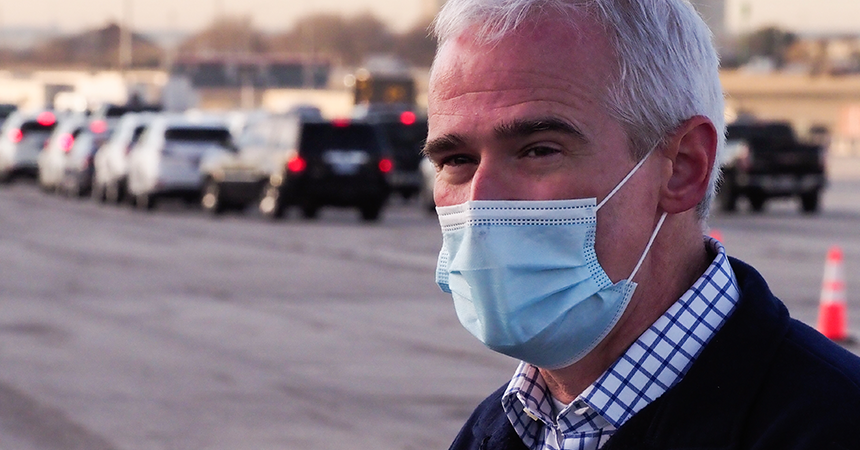HSC alumnus leads Denton County Public Health’s nationally-praised vaccine efforts in the charge against COVID-19

Denton County Public Health has grabbed national headlines lately as being one of the most successful COVID-19 vaccination hubs in the U.S.
Led by HSC graduate Matt Richardson, DrPH, MPH, FACHE, the department’s service area covers more than 900,000 North Texas residents, although people have come from other states, as far away as Pennsylvania, to get their vaccines.
Dr. Richardson completed both his doctoral and master’s degrees through the HSC School of Public Health in 2011 and 1999, respectively. He credits a good amount of Denton County Public Health’s success to COVID response planning that started in January 2020, coupled with community partnerships and enhanced by the department’s experience in preparing for widespread emergencies dating back two decades ago to September 11, 2001.
Since then, the department has advised Denton County through the national anthrax alerts of the early 2000s, the global SARS and H1N1 flu epidemic warnings, Ebola discovery and response in Dallas six years ago, West Nile and chikungunya mosquito virus monitoring each year, and other potential threats to the community’s health and safety.
“We started working closely after 9-11 with local school districts, universities, hospitals, emergency responders, state and national health agencies and other partners to prepare for potential emergencies that our region might face at any moment,” Dr. Richardson said. “We have two decades of experience in planning for mass vaccinations, mass dispensing of antibiotics, and getting medicines and treatment to the public in disaster situations.”
Response to the COVID-19 virus in the early months of 2020 was all about epidemiology, Dr. Richardson said. Public health departments were focused on tracking the disease and analyzing how it was spread, an important first learning step necessary for developing interventions to fight it.
“It’s always that way with a new disease discovery, with the tail wagging the response plan that will come,” he said.
Testing, mask and social distancing recommendations, quarantining positive cases, contact tracing, herd immunity estimations and analyzing, analyzing … all those steps have taken place as the country has raced toward COVID-19 solutions.
Vaccine breakthroughs were announced by the fall, and like other public health departments around the U.S., Denton County knew as the end of 2020 approached that any available vaccines would be scarce at first.
Dr. Richardson’s team – 150 on staff, with 100 who could be dedicated to COVID response – was ready to roll with the support of well-prepared community partners when the first batch of vaccines arrived in January.
30,000 doses followed in February.
By late February, with a week’s unexpected pause due to the Texas winter storm and resulting outages, Denton County had administered over 83,000 first doses of the vaccine and was beginning to schedule second dose appointments. Plans to connect thousands of others with their first doses were underway for March, pending updated vaccine availability.
Denton County purchased a sophisticated data management system on New Year’s Day that Dr. Richardson calls the “real linchpin” of their success. The system provides a secure QR code for anyone who registers that can only be used by that individual. It tracks lot numbers and different scheduling requirements among vaccine manufacturers, following and keeping people updated through their first, then their second doses.
Denton’s “VIP,” or Vaccine Interest Portal, sends automatic appointment notifications that allow people to reschedule if need be, or to take their name off the wait list if they’ve received a vaccine elsewhere.
“It’s like solving the Rubik’s Cube early,” Dr. Richardson said, “especially when you consider that changes and cancellation rates among public health departments can run as high as 30%.”
Other work has continued all these months at the public health department too, like TB control efforts, HIV/STD clinics, seasonal flu shots, routine children’s immunizations, environmental health operations, medical operations for the county jail, primary care and chronic disease management clinics for thousands in the local area, supplemental nutrition (WIC) programs for women and children, and more.
“A lot of plates are spinning all at once,” he said. “None of us in public health here or around the country could have prepared for such an extended emergency response.”
A lot has been learned over the last year, much has been accomplished, and along the way there have been many missed birthdays, family events, vacations and personal time off as the staff has remained dedicated and on track.
People have gotten sick, their families and friends have been impacted by COVID, there have been good days and bad, but regardless, Dr. Richardson said, “you just keep swimming.”
“People use the word unprecedented a lot, but we have never seen a vaccine so safe and effective as those being administered right now,” he said. “Our staff’s commitment and performance over this last year is true public health mission work, and I hope that when they finally put their heads on their pillows at night, they know how much they are making a difference.”






Social media